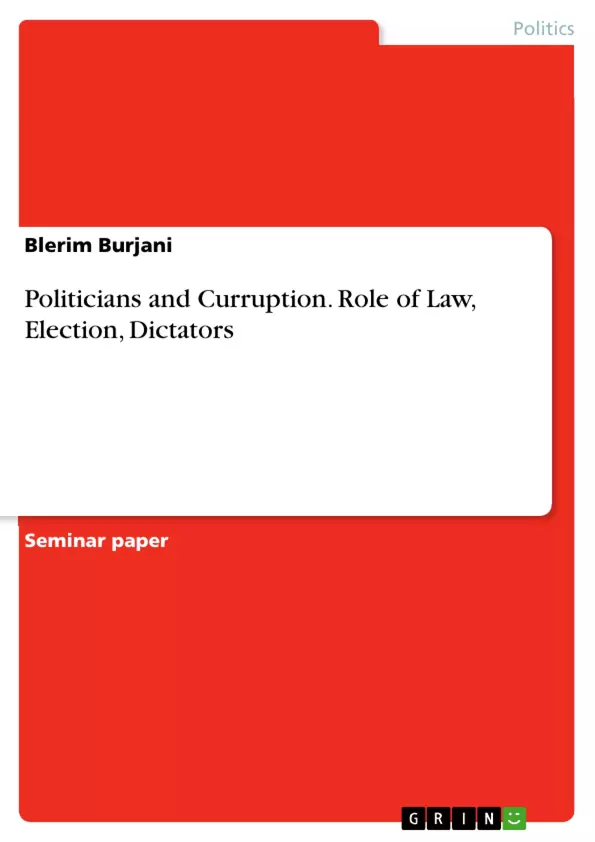Corruption is the most harmful thing to people, even though this is known and proven in many dimensions of human life, corruption lives deep in the human body, the desire for wealth, privileges, desires, for him many beautiful women and followed the man called politician, through voting in democracy he managed to control and decide on public assets, public money, the development of the business of making millionaires from the votes won by the citizens. Because when humanity is organized into classes, there is corruption, the majority they corrupted kings, presidents, prime ministers, ministers and deputies. Poor people in the Western Balkans manage to get rich from extreme poverty, many world presidents were corrupted, corruption is rampant in all continents where people live. So there is no human world that does not there is corruption behind it.
Inhaltsverzeichnis (Table of Contents)
- Abstract
- POLITICIANS AND CORRUPTION
- Corruption
- Most Corrupt African Dictators in Modern History
- World's Ten Most Corrupt Leaders
- Which countries are a Kleptocracy?
- The Post-Truth about Corruption in the European Union
- Global Corruption Barometer
- Confusion over corruption rules
- A history of corruption
- Pandora Paper
- Blood and dollars
- Trouble for politicians
- First Amendment role of journalism
- A fracas in Prague
- Montenegro
- Is there corruption in Serbia?
- Does Albania have corruption?
- Can a monarchy be corrupt?
- Conclusion
- Table 1.
- Table 2.
- Tabl3.
- Literature.
Zielsetzung und Themenschwerpunkte (Objectives and Key Themes)
This work aims to explore the pervasive nature of corruption and its impact on various aspects of human life, particularly within the realm of politics. The author delves into historical examples, contemporary cases, and international perspectives to analyze the mechanisms, consequences, and potential solutions for tackling this issue.
- The multifaceted nature of corruption and its prevalence across different societies
- The role of politicians and political systems in perpetuating and combating corruption
- The impact of corruption on various aspects of society, such as democracy, economic development, and human rights
- The challenges and strategies for addressing corruption at national and international levels
- The importance of transparency, accountability, and the rule of law in curbing corruption
Zusammenfassung der Kapitel (Chapter Summaries)
The initial chapters provide a comprehensive overview of corruption, exploring its definition, historical context, and prevalent forms in different societies. The author delves into specific examples of corruption in various countries, including African dictatorships, world leaders, and European Union institutions.
Subsequent chapters focus on the influence of corruption on political systems and its impact on democracy, justice, and economic development. The text examines the role of journalism in exposing corruption and the challenges faced by journalists in their pursuit of truth. Specific cases in Prague, Montenegro, Serbia, and Albania are analyzed to highlight the complexities and varying degrees of corruption in these regions.
Schlüsselwörter (Keywords)
This work explores the multifaceted nature of corruption, its impact on political systems, and the strategies for combating this pervasive issue. The text draws upon historical examples, contemporary cases, and international perspectives to highlight the role of politicians, law, elections, and democratic processes in the fight against corruption. Key terms include corruption, politicians, law, elections, dictators, democracy, transparency, accountability, and rule of law.
- Arbeit zitieren
- Blerim Burjani (Autor:in), 2023, Politicians and Curruption. Role of Law, Election, Dictators, München, GRIN Verlag, https://www.hausarbeiten.de/document/1338509


